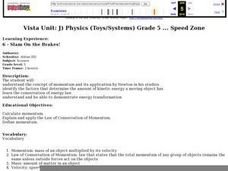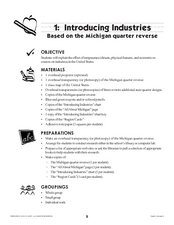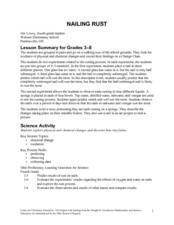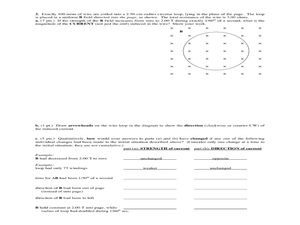Curated OER
Slam On the Brakes!
Fifth graders study the concept of momentum and its application by Newton in his studies. They view a demonstration and complete an experiment with toy cars on a racetrack that shows them the properties of momentum and how velocity and...
Curated OER
Magnificent Magnets
Students identify the properties of a magnet. In this physics lesson, students explore the strength of the magnet by testing out how a magnet reacts to various materials. The various objects the students test include paper clips, paper,...
Curated OER
Hydrocarbons
Making models is always memorable. In this activity, physical science starters examine the structure of hydrocarbons using marshmallows, raisins, and toothpicks. They even act as atoms themselves and link arms to represent covalent...
Curated OER
Best Part of Me
After listening to the story, The Best Part of Me, learners will identify a positive physical feature of themselves, and create a descriptive poem about their favorite feature. Photographs are taken, and a nice final draft of the poem is...
Colombia University NSEC
Lesson #3 ~ Nanoscience and Nanotechnology
Here is a six-page script for your biology, chemistry, or physics class to read out loud as a way of investigating nanoscience. This particular lesson is actually a continuation of "Lesson #2 - Nanoscience and Nanotechnology," written in...
Curated OER
Freestanding Structures: A Tech Museum Floor Activity
Young scholars attempt to design the tallest structure that they can with the given materials which are wooden dowels and rubber bands. They discuss the physics of their structure and how they would improve it the next time they built a...
Teach Engineering
Rocks, Rocks, Rocks: Test, Identify Properties and Classify
Time is growing short. Teams work together to identify physical properties of rocks in order to determine the properties that would best suit their cavern shelter design.
Curated OER
Photocells II: The Photoelectric Effect in Photocells
It's not easy to find fabulous physics lesson plans, but School Power Naturally has put together a series of them. In this particular lesson, high schoolers learn about the structure and functioning of photovoltaic cells. They construct...
Curated OER
Atomic Structure and Ionic Bonding (A Visual Approach)
Using toothpicks, marshmallows, and round colored sticky dots, physical science enthusiasts build models of an atomic nucleus. In this eighth grade chemistry lesson plan, they play an atom-naming game with the models that they have...
Curated OER
Air Pressure
Learners participate in a series of demonstrations about Bernoulli's principle. They explain how air pressure varies with air speed. They write a detailed lab report about the activity. This is a great way to explore this concept.
Curated OER
Introducing Industries
If you are looking for a way to explore Michigan's resources, physical features, and more, this lesson is for you. After discussing Michigan and the Great Lakes, learners fill out a graphic organizer identifying the state's natural...
Council for the Curriculum, Examinations and Assessment
Managing Change
Learning to embrace the opportunities and challenges change presents is the focus of the exercises and activities in this fifth session of a 10-lesson course on Social, Physical, Emotional, Cognitive and Spiritual (SPECS) health....
Curated OER
Refraction B2—When is Light Reflected Internally?
Physics is phun in this instructional activity. Young physicists use a lightbox to test how and where light is refracted and reflected as it travels through transparent materials. Angles of incidence and refraction, sine of both...
University of Colorado
Looking Inside Planets
Researchers use scientific data to understand what is inside each of the planets. The first in a series of six, this lesson builds off of that concept by having pupils use a data table to create their own scale models of the interiors of...
DiscoverE
Slinky® Science
Toys are great for learning about physics. Scholars use Slinky® toys to study Newton's laws of motion and types of energy. After a little play, they then model longitudinal and transverse waves with the Slinky® toys.
Florida Department of Health
Understanding the Risk of Substance Abuse Unit
Teenage brains are different! Understanding that the teenage brain is still developing and thus more impacted by substance abuse is the key concept in a three-lesson high school health unit. Participants learn about how the brain and...
Curated OER
Shrinky Dinks® Palettes
Here is a fun and clever lesson for teaching physics classes how to calculate wavelength if given the energy and frequency data. On a worksheet, they compute wavelengths using a table of information that you provide. On a paper palette,...
Curated OER
Nailing Rust
When your upper elementary or middle school class is learning about chemical changes, these activities help demonstrate the concepts. In Part A, they submerge and place a nail partially underwater, then after a week they make...
Curated OER
Fall 2003 Midterm Exam #2
Your physics students will really shine when they take this midterm exam. It covers a variety of concepts dealing with electromagnetic spectra, electricity, and motors and it provides a variety of question styles.
Curated OER
Take-Home Midterm Exam #3, Part A
Let your physics learners take this electromagnetic radiation exam home to show what they know. You could also use it in class or assign it as a review. The content covers concepts pertaining to color, wavelength, frequency,...
BioEd Online
Muscles and Bones in Space
Being an astronaut takes not only high mental acuity, but also a high level of physical fitness, especially for those who spend a long amount of time away from Earth, such as the astronauts serving on the International Space Station....
Foundation for Water & Energy Education
What is the Water Cycle? Activity B
Curious physical scientists follow a lesson on the properties of water with this lesson on distillation. They observe a miniature water cycle model that filters dirty water into clean water. These two lessons combined are an enriching...
Wordpress
Greetings - How and Where Might We Greet Someone Using Spanish?
Use the Total Physical Response (TPR) strategy to practice Spanish greetings as well as where and who question prompts. Comprised of five days, this short unit is taught completely in Spanish with call-and-response exercises,...
NOAA
Biological Oceanographic Investigations – Through Robot Eyes
How can a robot measure the length of something when we don't know how far the camera is from the object? The lesson explains the concept of perspective and many others. Scholars apply this knowledge to judge the length of fish and the...
Other popular searches
- Physics Concepts Momentum
- Physics Concepts on Pressure
- Physics Concepts Motion
- Physics Concepts Force
- Physics Concepts Light
- Physics Concepts 24
- Different Physics Concepts
- Physics Concepts Flight























